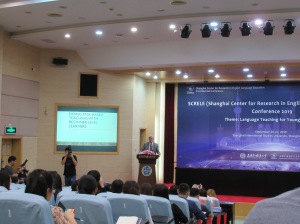As 2023 draws to a close, we look back at all the big moments for the CVP/MM team over the past year.
 As ever, we had a busy year for new books with plenty of exciting titles to keep you reading right through 2024! To name just a few, on the Multilingual Matters side we had Quality and Equity in Education edited by Michael Byram, Mike Fleming and Joseph Sheils, Making Connections by John Corbett, Hugo Dart and Bruno Ferreira de Lima, A Panorama of Linguistic Landscape Studies by Durk Gorter and Jasone Cenoz (which is available open access), the second edition of Teaching Languages to Students with Specific Learning Differences by Judit Kormos and Anne Margaret Smith, Spanish So White by Adam Schwartz (including our first ever foray into audiobooks!) and Political Activism in the Linguistic Landscape by Philip Seargeant with Korina Giaxoglou and Frank Monaghan.
As ever, we had a busy year for new books with plenty of exciting titles to keep you reading right through 2024! To name just a few, on the Multilingual Matters side we had Quality and Equity in Education edited by Michael Byram, Mike Fleming and Joseph Sheils, Making Connections by John Corbett, Hugo Dart and Bruno Ferreira de Lima, A Panorama of Linguistic Landscape Studies by Durk Gorter and Jasone Cenoz (which is available open access), the second edition of Teaching Languages to Students with Specific Learning Differences by Judit Kormos and Anne Margaret Smith, Spanish So White by Adam Schwartz (including our first ever foray into audiobooks!) and Political Activism in the Linguistic Landscape by Philip Seargeant with Korina Giaxoglou and Frank Monaghan.
 Meanwhile, a couple of the key titles this year under the Channel View Publications imprint were Changing Practices of Tourism Stakeholders in Covid-19 Affected Destinations edited by Erdinç Çakmak, Rami K. Isaac and Richard Butler and Control, Abuse, Bullying and Family Violence in Tourism Industries by Elisa Zentveld.
Meanwhile, a couple of the key titles this year under the Channel View Publications imprint were Changing Practices of Tourism Stakeholders in Covid-19 Affected Destinations edited by Erdinç Çakmak, Rami K. Isaac and Richard Butler and Control, Abuse, Bullying and Family Violence in Tourism Industries by Elisa Zentveld.
 We also continued with our online events, originally established in 2020 during the pandemic, when we weren’t able to attend conferences and wanted another way to promote our books. It’s been great to be able to include Q&As at the end of our events so that anyone watching can have the opportunity to ask an expert in their field a question.
We also continued with our online events, originally established in 2020 during the pandemic, when we weren’t able to attend conferences and wanted another way to promote our books. It’s been great to be able to include Q&As at the end of our events so that anyone watching can have the opportunity to ask an expert in their field a question.
This year we’ve had events with authors Gary Barkhuizen and Chika Takahashi about their books in our Psychology of Language Learning and Teaching series, JPB Gerald speaking about his book Antisocial Language Teaching and Adam Schwartz with his book Spanish So White. These events have been a valuable addition to our calendar and we appreciate everyone who has joined us and asked thoughtful questions of our speakers. We’ll be bringing you some more events with our authors in 2024, so watch this space…
 2023 has felt like the first year where we’ve got back to a full conference schedule after tentatively dipping our toe back in the water last year. On the Channel View Publications side we’ve attended CAUTHE, ATLAS and the Surrey conference, while on the Multilingual Matters side we’ve been to AAAL, The Forum on Education Abroad, IATEFL, the Postgraduate Researcher Conference, Language Policy Forum, AILA, BAAL, InDialog, ALAPP, EuroSLA, Better Bilingual EAL Celebration Event and NALDIC. It’s been lovely to reconnect with our authors, friends and fellow publishers and we’re looking forward to another jampacked year in 2024!
2023 has felt like the first year where we’ve got back to a full conference schedule after tentatively dipping our toe back in the water last year. On the Channel View Publications side we’ve attended CAUTHE, ATLAS and the Surrey conference, while on the Multilingual Matters side we’ve been to AAAL, The Forum on Education Abroad, IATEFL, the Postgraduate Researcher Conference, Language Policy Forum, AILA, BAAL, InDialog, ALAPP, EuroSLA, Better Bilingual EAL Celebration Event and NALDIC. It’s been lovely to reconnect with our authors, friends and fellow publishers and we’re looking forward to another jampacked year in 2024!
 Now that most of our staff don’t live in Bristol (we’re spread out from Dunblane in Scotland to Dawlish in Devon), we don’t get to see each other as much as we’d like. To go some way towards remedying this, we’ve established in-person meetings held every couple of months that we all attend in Bristol, with an obligatory lunch together, of course.
Now that most of our staff don’t live in Bristol (we’re spread out from Dunblane in Scotland to Dawlish in Devon), we don’t get to see each other as much as we’d like. To go some way towards remedying this, we’ve established in-person meetings held every couple of months that we all attend in Bristol, with an obligatory lunch together, of course.
In October we announced the creation of the Channel View Publications / Multilingual Matters Open Access Fund. Each year we will fully fund at least one open access publication to support authors who wouldn’t otherwise be able to fund open access publication for their work. We’re really proud of this initiative and hope it will increase visibility, dissemination, use and impact of top-quality academic research, particularly for research originating in Low to Middle Income Countries and scholars working outside of traditional academic institutions.
 Also in October, we had some very exciting news – Laura had a baby! Luckily we didn’t have to wait too long to meet Nicholas, as she brought him into the office to visit us when he was just a couple of weeks old!
Also in October, we had some very exciting news – Laura had a baby! Luckily we didn’t have to wait too long to meet Nicholas, as she brought him into the office to visit us when he was just a couple of weeks old!
It’s been a good year for Channel View Publications / Multilingual Matters and we’d like to thank you all for your support and wish you a very merry Christmas and happy new year!








































